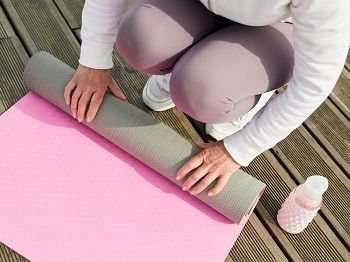5 Steps for Better Sleep as We Age
Article by Alex Milzer - bio on our Editorial Team.
Some people believe if you sleep naked, you will get better sleep. It is funny the things people conjure up to get a good night's rest. The truth is, as you age, your body not only produces fewer growth hormones, decreasing your levels of REM sleep, but you also produce less melatonin, and therefore experience more fragmented sleep. This leads to the utmost important question. As we age, how do we increase sleep production while also improving its quality?
Step 1: Figure Out How Many Hours of Sleep you Need
Try an experiment. Turn off your alarm clock and block any distractions that could wake you, like your phone. Be sure to keep the window blinds cracked a bit so that some natural sunlight can get in at dawn. Then proceed to go to sleep. When you wake up in the morning, count how many hours your body allowed you to sleep. One attempt can be deceiving. So be sure to go the whole week following the same process. After a week, you probably will know how many hours of sleep your body needs for a full night's rest.
Why is this important? Because people tend to fall asleep at various times of the night but set their alarm at the same time every morning. Consequently, your total hours of sleep fluctuate, causing your nightly average of sleep to vary, as well. If you know that you need 7 hours of sleep, for example, and you should wake up at 5 am, you should fall asleep at 10 pm. But if you happen to fall asleep at 11 pm, then push your alarm to 6 am so you can get your full 7 hours. Unless you HAVE to wake up at your usual time, don't sweat; adjust your sleep schedule slightly. Your body will thank you during waking hours!
Age Chart - Hours of Sleep
| Age | Recommended | Subjective to Individual |
| 5–13 years old | 10 hours | 8-11 hours |
| 14-18 years old | 9 hours | 7-10 hours |
| 19-64 years old | 8 hours | 7-9 hours |
| 65+ | 7 hours | 7-8 hours |
Step 2: Figure Out What Time You Ideally Want to Wake Up
The ancient Greek philosopher, Heraclitus, stated, "life is in flux." The time you arise in the morning is also changing during different stages of life. At one time, you may have needed to wake up at 5 am every day for work, but now you can sleep as late as 8 pm if you choose. At this time in your life, you need to decide exactly what time is best for you to wake up in the morning. So, let's say you want to wake up every morning at 6 am. You also know that you need a good 7 hours of sleep to feel fully rested, then hypothetically you should be asleep by 11 pm. The problem is that people tend to go to bed later than they should, based on their wake time.
Since this is a common problem, how do we ensure we consistently go to bed at the correct time every night? The solution is committing to arise every morning at your desired time for one week straight, regardless if you don't get a full night's rest. After a week straight of waking up at your preferred time, your body will reset its Acadian rhythm, and you will start to get tired earlier in the night, forcing you to go to bed earlier.
Step 3: Prioritize Your Morning Before Going to Bed
One of the main reasons people can't fall asleep at night is they suffer from the "monkey brain" phenomenon. Meaning, they lay in bed trying to fall asleep, but their brain is going through all of the things they have to do the next day, ultimately causing anxiety and procrastinated sleep. One effective solution is to prioritize your morning before going to bed. Try writing down five things you are going to accomplish before noon. This way, there is no uncertainty about your game plan for the first half of the day. Consequently, when your head hits the pillow, you have defeated the monkey brain and can close your eyes and enjoy the present moment. By clearing your mind of tomorrow, you can relax and be more mindful now. Here is a whole category dedicated to mindfulness.
Step 4: Avoid Napping During the Day
Napping during the day can negatively impact sleep production at night. Generally, you should avoid napping, as studies show a correlation between napping and the inability to fall asleep at night. According to Sleep Foundation, if you take a nap, the ideal length should be between 10-20 minutes and should occur before 2 pm. If you are an avid napper, try going outside and taking a walk in the sunlight when you usually nap. Sunlight and light exercising can naturally boost energy levels.
Step 5: Get Proper Nutrition and Regular Exercise
Physical health and sleep are interconnected. On the one hand, poor sleep leads to increased chances of weight gain. And on the other hand, overweight or even obese people have a higher risk of inadequate sleep production. It's a double edge sword!
Common health problems resulting from being overweight include depression, gastroesophageal reflux disease (GERD), obstructive sleep apnea (OSA), osteoarthritis, and asthma. All of which can cause poor sleep.
Regular exercise and conscious diet choices help increase sleep production in numerous ways. Not only are we less likely to become overweight and obese, avoiding the above health problems, but we also are more self-confident, less anxious and depressed, have a better immune system, and overall happier. Optimal times to exercise are during the morning and mid-afternoon. Try avoiding exercising late a night, as this could give you a boost in energy, pushing back your bedtime hour. Here is a full category on the topic of exercise and nutrition.


